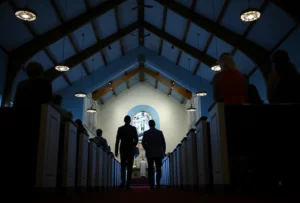
Congregants at Ruthfred Free Lutheran Church on July 14 in Bethel Park, Pa. (Matt McClain/The Washington Post)
First, you have to talk to them.
Can Jesus really expect us to embrace our political enemies?
By Rick Hamlin – Washington Post
July 29, 2024 at 6:15 a.m. EDT
Sometimes I ask myself, “What would Jesus say?” Not the fabled “What would Jesus do?” (WWJD) of a distant era, but rather what would He say? Any comforting words He might have for us after we’ve watched a gripping, baffling news report full of rancor or when we put down the morning paper, chagrined about the latest events?
The phrase that comes to mind, the one I can hear in my head when I log off in despair, overwhelmed by the visceral conflicts that grip our nation, is a simple one — so simple that it’s a struggle to put into practice — but there it is, right in the heralded Sermon on the Mount: “Love your enemies.” Huh, I want to say. How am I going to do that?
If you asked me what I believe, I could give you the denomination of the church I attend, or you could look over my shoulder at the Bible I skim while I eat breakfast — the Hebrew scriptures and the New Testament all in one. I tell myself I’ll try to absorb the good news before bad news rattles my brain. Sometimes I’ll offer up the label of a “Jesus follower” if asked. That seems neutral enough. But it also tells me I have my work cut out. It’s not always easy to follow Jesus.
For instance, how do I love my enemies or pray for them, as He asks of us? How do we pray for the ones who persecute us? Who’s persecuting me? I’ve never really thought I had enemies. I like people; they seem to like me. I generally don’t get into deep political conversations with them. After all, weren’t we taught to refrain from discussing religion or politics in any social situation? It simply wasn’t polite.
However, if you look around, you might find that you’ve created a bubble where everybody would agree with what you have to say, even if you accidentally — or not so accidentally — brought up a controversial topic. Love your enemies? You don’t see them around here. They’re somewhere else, in another room, in another city, in another state. Without even realizing it, you’ve successfully insulated yourself. But how good is that? What are you learning if you’re never challenged? How much love do you really have if you don’t try to do what Jesus asks?
Aren’t our enemies sometimes our very selves, those dark parts of us, what Carl Jung might have called our shadow selves? It’s so much easier to project them onto others than acknowledge them in our souls and try to understand. To love our enemy inside.
I had a grandfather, long dead by now, who simply despised President Franklin D. Roosevelt and what he had done to the country. His hatred even extended to FDR’s wife, Eleanor. But then, by accident, or providence, he ended up sitting next to her on a long flight. He was a businessman, and she had innate fascination with what business executives had to do to succeed and peppered him with questions.
He left that flight with his opinion changed. He thought Eleanor Roosevelt one of the loveliest people he had ever met. He wasn’t going to change his vote, but his world had expanded. His apparent enemy was infinitely lovable. People might have been more polite back then, but the conflicts could be just as intense across the aisle. What I envy was the chance he had to step out of his bubble. What a transformation.
No one today seems to inspire such widespread love as Eleanor Roosevelt once did. There is too much political divisiveness muddying the water. I’m often being told who my enemies are, but why do I have to sign up for that? Can’t I love them instead? Maybe that’s just what I need.
I think this is what Jesus is asking me, asking us, to do. Am I a hopeless optimist to believe that loving our enemies is possible? Why should we destroy ourselves with divisiveness and hatred? There is a better way.